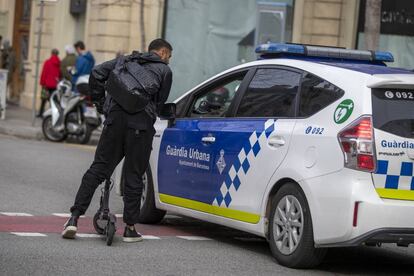Traffic accidents involving scooters quadruple in Barcelona
Authorities are worried about the high number of violations involving these personal mobility vehicles


The growing presence of electric scooters on city streets is beginning to affect accident statistics in Barcelona. Figures from last year indicate that the numbers of motorized personal mobility vehicles – essentially electric scooters – involved in accidents almost quadrupled, jumping from 129 in 2018 to 490 in 2019. Most of these accidents were cases of side-on collisions and pedestrians being knocked over. Electric scooters have only been in the city for a few years but already constitute 2.6% of the total number of vehicles involved in accidents.
It is important to drive with a helmet and insuranceMobility councilor Rosa Alarcón
Authorities have expressed concern over the high number of traffic violations these vehicles have been involved in, with 20,000 cases reported. A total of 6,546 fines were handed out to personal scooter users in 2019, three times more than in 2018. Meanwhile fines for rental scooters amounted to 13,441 – almost nine times more than the previous year. The majority of fines for privately owned scooters was for traffic violations, while scooters for hire were fined for parking infractions.
The head of security at Barcelona City Hall, Albert Batlle, admitted that there has been an “exponential rise” in the number of scooters on the streets and said that the local government is putting pressure on Spain’s DGT traffic authority to create basic regulations on road safety – including the wearing of helmets and the use of reflectors for visibility – that can be adapted to Barcelona’s traffic rules. Meanwhile, the mobility councilor, Rosa Alarcón, urged scooter drivers to “go beyond specified regulations and protect themselves: it is important to drive with a helmet and insurance,” she said.
A total of 22 people died on Barcelona’s roads in 2019 – one more than in 2018. Nineteen of the victims were men and three were women. The victims included one cyclist who worked for the food-delivery service Glovo, and five pedestrians – three fewer than in 2018. The number of motorcyclists killed rose from 11 in 2018 to 14, the worst figure since 2015. Fatalities among scooter drivers dropped from two to one, and there was one fatal accident involving a bus passenger.
Every day, 19 drivers are fined for being over the alcohol limit in Barcelona
In 2019, 11,832 people were injured in road accidents, a figure very similar to 2018. The number of seriously injured fell from 238 in 2018 to 202 in 2019, with 91% of the seriously injured being either motorcyclists (66%), cyclists or drivers of personal mobility vehicles – the most vulnerable groups on the road. Among the injured, 367 had rented out motorbikes. The accidents were principally caused by distractions, not respecting safety distances and taking unlawful turns.
Of the 18,975 road accidents, most involved cars (7,426) and motorbikes (6,062), followed by vans (1,228), mopeds (951), taxis (637), bicycles (796), trucks (417), electric scooters (490), and non-motorized scooters (49), with another 919 vehicles placed in the unspecified-vehicle category. The city council has yet to publish the 2018 Basic Mobility Data report, although it has given assurances that it will be issued soon, along with the 2019 figures.
Another striking piece of data from the report is that every day, 19 drivers are fined for being over the alcohol limit, five fail drug tests, and there are 951 fines for speeding. To tackle these issues, mobility councilor Rosa Alarcón announced the installation of 20 new speed cameras on streets such as Balmes, Gran Vía, Urgell and Aragó. “This is not a measure to raise funds, it is a measure to reduce the number of accidents in the city,” she said.
English version by Heather Galloway.
Tu suscripción se está usando en otro dispositivo
¿Quieres añadir otro usuario a tu suscripción?
Si continúas leyendo en este dispositivo, no se podrá leer en el otro.
FlechaTu suscripción se está usando en otro dispositivo y solo puedes acceder a EL PAÍS desde un dispositivo a la vez.
Si quieres compartir tu cuenta, cambia tu suscripción a la modalidad Premium, así podrás añadir otro usuario. Cada uno accederá con su propia cuenta de email, lo que os permitirá personalizar vuestra experiencia en EL PAÍS.
¿Tienes una suscripción de empresa? Accede aquí para contratar más cuentas.
En el caso de no saber quién está usando tu cuenta, te recomendamos cambiar tu contraseña aquí.
Si decides continuar compartiendo tu cuenta, este mensaje se mostrará en tu dispositivo y en el de la otra persona que está usando tu cuenta de forma indefinida, afectando a tu experiencia de lectura. Puedes consultar aquí los términos y condiciones de la suscripción digital.








































